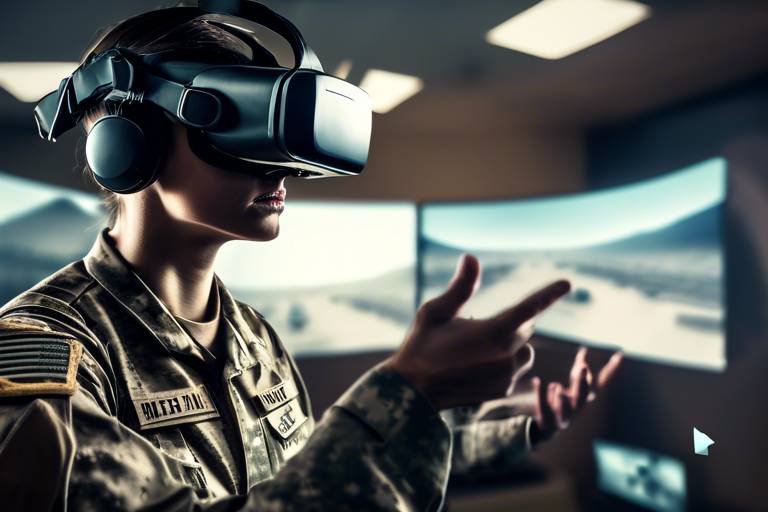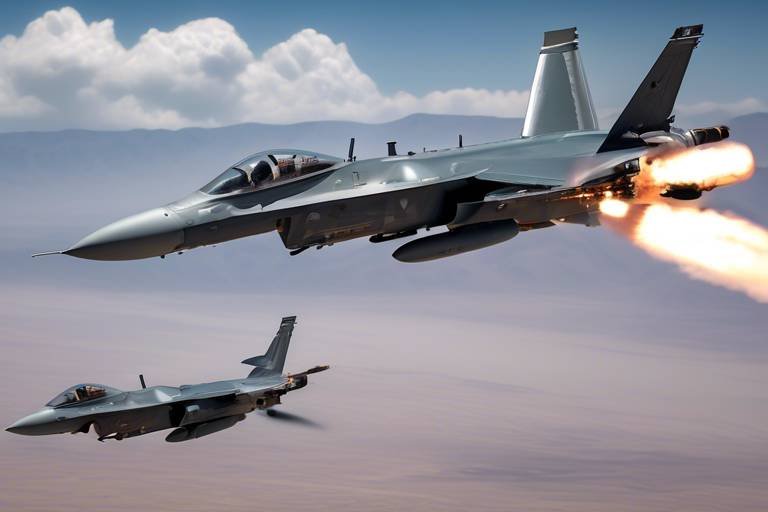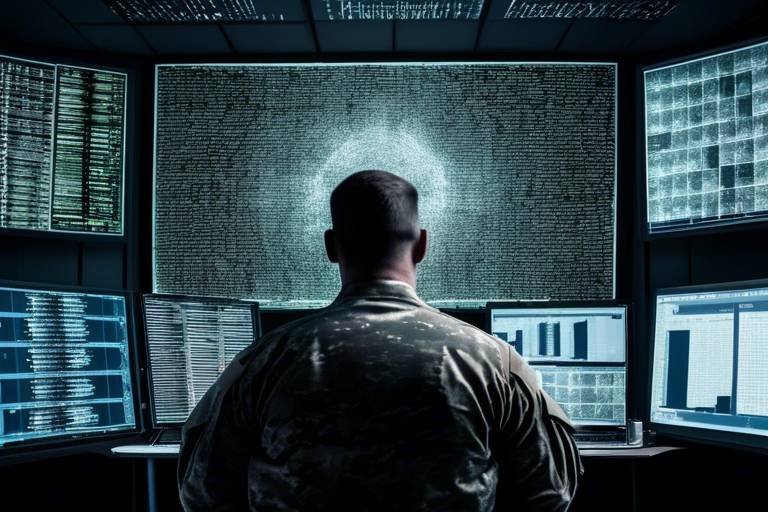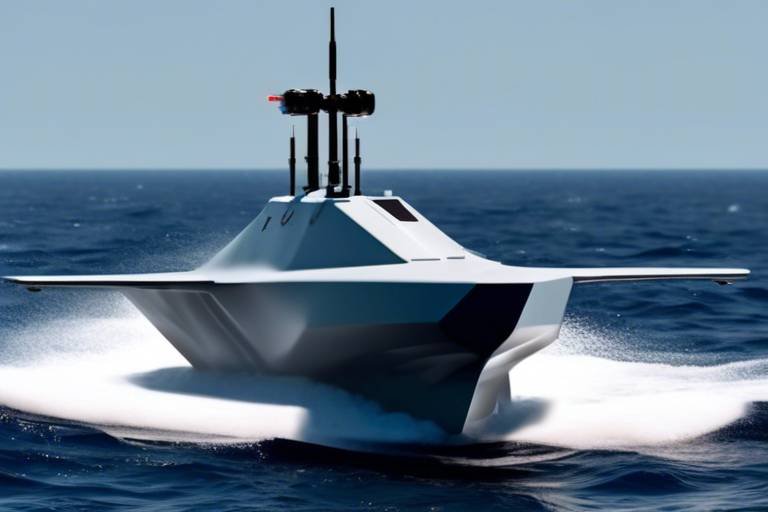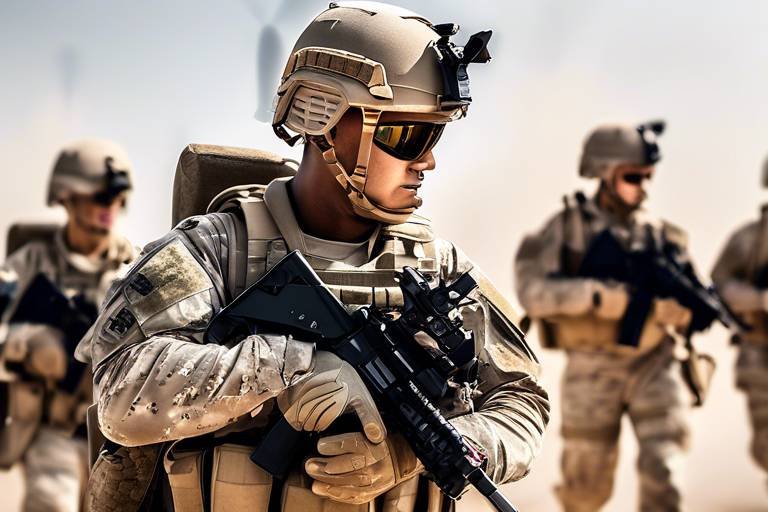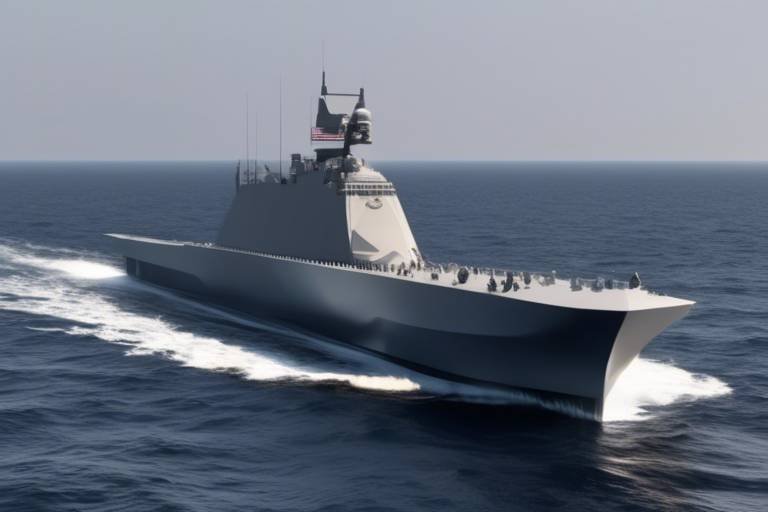The Role of Quantum Computing in Military Data Analysis
In an age where information is power, the military's ability to analyze data swiftly and accurately has never been more crucial. Enter quantum computing, a game-changer that is set to revolutionize military data analysis. Imagine a world where complex calculations that once took hours or even days can be completed in mere seconds. This is not science fiction; it's the reality that quantum computing brings to the table. By harnessing the unique principles of quantum mechanics, military organizations can enhance their decision-making processes and operational efficiency like never before.
At its core, quantum computing utilizes qubits, which can exist in multiple states at once, allowing for the processing of vast amounts of data simultaneously. This capability transforms how military analysts sift through mountains of information, enabling them to identify patterns, correlations, and insights that traditional computing methods might miss. It's akin to having a supercharged magnifying glass that reveals hidden details in a complex tapestry of data.
The implications for military strategy are profound. Imagine a battlefield where commanders can access real-time data analysis, leading to quicker and more informed decisions. With quantum computing, simulations for tactical planning can be run at lightning speed, allowing military leaders to allocate resources more effectively and anticipate enemy movements with unparalleled accuracy.
Furthermore, the security of military communications is paramount. Quantum computing offers advanced encryption methods that ensure data integrity and secure communication channels. This is crucial in an era where cyber threats loom large. Techniques like Quantum Key Distribution (QKD) leverage the principles of quantum mechanics to create secure channels that are nearly impossible to breach. This ensures that sensitive military information remains confidential, safeguarding it from potential espionage.
As we look to the future, the development of post-quantum cryptography becomes essential. With the rise of quantum computing, traditional encryption methods may become obsolete, leaving military data vulnerable to quantum attacks. By investing in post-quantum cryptography, military organizations can ensure the long-term security of classified information, adapting to the evolving technological landscape.
However, the journey towards fully integrating quantum computing into military data analysis is not without its challenges. High costs, technological limitations, and a shortage of specialized skill sets pose significant hurdles. Nevertheless, the potential benefits far outweigh these obstacles. As military organizations continue to explore and invest in quantum technologies, the future of military data analysis looks not just promising, but revolutionary.
- What is quantum computing? Quantum computing is a type of computing that uses quantum bits (qubits) to perform calculations at speeds and efficiencies far beyond those of traditional computers.
- How does quantum computing benefit military operations? It enhances data analysis, improves decision-making processes, and provides advanced encryption methods for secure communication.
- What are the challenges of implementing quantum computing in the military? Challenges include high costs, technological limitations, and the need for specialized skills.
- What is Quantum Key Distribution (QKD)? QKD is a method that uses quantum mechanics to securely distribute encryption keys, ensuring that communications remain private and secure.
- Why is post-quantum cryptography important? As quantum computing advances, post-quantum cryptography is crucial for protecting sensitive data from potential quantum attacks.

Understanding Quantum Computing
Quantum computing is an exciting frontier in the realm of technology, leveraging the fascinating principles of quantum mechanics to perform complex calculations at speeds that were once thought to be the stuff of science fiction. Imagine a world where computers can solve problems that would take traditional computers thousands of years in mere seconds! This revolutionary technology is fundamentally changing how data is processed and analyzed, especially in critical fields like military applications.
At its core, quantum computing relies on quantum bits or qubits, which differ significantly from the classical bits we are familiar with in traditional computing. While a classical bit can exist in one of two states—either 0 or 1—a qubit can exist in a state of 0, 1, or both simultaneously, thanks to a phenomenon known as superposition. This unique property allows quantum computers to process a vast amount of information at once, making them incredibly powerful for data analysis.
Moreover, another key aspect of quantum computing is entanglement, where qubits become interconnected in such a way that the state of one qubit can depend on the state of another, no matter the distance separating them. This allows for instantaneous data transfer and processing, further enhancing the capabilities of quantum systems. To illustrate, consider a team of military analysts working on a critical mission. With quantum computing, they could analyze multiple scenarios and outcomes simultaneously, leading to faster and more informed decision-making.
The implications of quantum computing extend far beyond just speed. It opens up new avenues for solving complex problems that were previously considered intractable. For instance, military operations often involve analyzing vast datasets, from satellite imagery to intelligence reports. With quantum computing, military strategists can uncover patterns and insights that traditional computing methods may overlook, ultimately enhancing operational efficiency and effectiveness.
As we dive deeper into the realm of quantum computing, it’s important to recognize the challenges that come with it. The technology is still in its infancy, and while there are promising developments, there are also significant hurdles to overcome. Issues such as high costs, technological limitations, and the necessity for specialized skill sets can impede its widespread adoption in military contexts. Nevertheless, the potential benefits are so substantial that many experts believe investing in quantum technology is a strategic imperative for the future of military operations.
In summary, understanding quantum computing is crucial for grasping its transformative potential, especially in military data analysis. As this technology continues to evolve, it promises to reshape how data is processed, analyzed, and utilized, paving the way for a new era of decision-making and operational strategy.

Applications in Military Strategy
In today's fast-paced world, where every second counts, quantum computing is emerging as a game-changer in military strategy. Imagine having the ability to process vast amounts of data in the blink of an eye; that's what quantum computing brings to the table. By harnessing the power of quantum mechanics, military organizations can analyze complex datasets much faster than traditional computing methods ever could. This results in enhanced decision-making processes that are crucial during critical operations.
One of the most significant advantages of quantum computing in military strategy is its ability to provide real-time data analysis. Consider a battlefield scenario where commanders need immediate insights to make tactical decisions. With quantum computing, they can analyze incoming data from various sources—such as drones, satellites, and ground troops—almost instantaneously. This capability allows for quick adjustments to strategies, ensuring that military forces remain one step ahead of potential threats.
Moreover, quantum computing enhances simulations for tactical planning. By processing complex models that incorporate numerous variables, military strategists can run simulations that predict outcomes of various scenarios. This is akin to playing a game of chess where each possible move is analyzed in real-time, allowing commanders to foresee their opponent's strategies and counter them effectively. The result? More informed resource allocation and better-prepared forces.
To illustrate the impact of quantum computing on military strategies, consider the following table that outlines some key applications:
| Application | Description |
|---|---|
| Real-Time Data Analysis | Instant processing of battlefield data for quick decision-making. |
| Tactical Simulations | Enhanced modeling for predicting various combat scenarios. |
| Resource Allocation | Optimized deployment of military assets based on data insights. |
| Threat Assessment | Improved identification of potential risks through advanced analytics. |
As we delve deeper into the realm of military strategy, it's essential to recognize that the implications of quantum computing extend beyond mere data analysis. The technology also plays a pivotal role in enhancing operational efficiency. By streamlining processes and providing actionable insights, military units can execute missions with greater precision and reduced risk. This is especially important in scenarios where every minute can mean the difference between success and failure.
In summary, the applications of quantum computing in military strategy are vast and varied. From real-time data analysis to advanced tactical simulations, this revolutionary technology is reshaping how military forces operate. As we continue to explore the potential of quantum computing, one thing is clear: the future of military strategy is not just a matter of speed but also of intelligence and adaptability.
- What is quantum computing? Quantum computing utilizes the principles of quantum mechanics to perform computations at speeds unattainable by classical computers.
- How does quantum computing impact military strategy? It enhances data analysis, improves decision-making processes, and optimizes tactical planning through advanced simulations.
- What are the challenges of implementing quantum computing in the military? High costs, technological limitations, and the need for specialized skill sets can hinder its widespread adoption.
- Is quantum computing secure? Yes, quantum computing offers advanced encryption methods, ensuring secure communication and data integrity.

Data Encryption and Security
In today's digital age, where data breaches and cyber threats loom large, data encryption and security are paramount, especially in military operations. The unique capabilities of quantum computing offer advanced encryption methods that ensure secure communication and data integrity. This is crucial for military operations, where information can mean the difference between victory and defeat. Imagine a world where sensitive military communications can be transmitted without the fear of interception—this is the promise that quantum computing brings to the table.
One of the most revolutionary aspects of quantum computing in the realm of data security is its ability to utilize Quantum Key Distribution (QKD). This method employs the principles of quantum mechanics to create secure communication channels. Unlike traditional encryption methods, which can be vulnerable to hacking, QKD ensures that any attempt at eavesdropping will be detected. The moment a third party tries to intercept the communication, the quantum state of the data changes, alerting the parties involved. This level of security is unparalleled and is essential for safeguarding sensitive military information against potential cyber threats and espionage.
Moreover, as quantum computing continues to evolve, the development of post-quantum cryptography becomes increasingly important. With the potential rise of quantum computers capable of breaking existing encryption algorithms, military organizations must prepare for a future where their classified information could be at risk. Post-quantum cryptography aims to create algorithms that are secure against the computational power of quantum computers. This proactive approach ensures that military data remains protected, regardless of advancements in technology.
To illustrate the differences between traditional encryption methods and quantum encryption, consider the following table:
| Aspect | Traditional Encryption | Quantum Encryption |
|---|---|---|
| Vulnerability | Susceptible to hacking | Detects eavesdropping |
| Key Distribution | Requires secure channels | Uses quantum mechanics |
| Future-Proofing | May become obsolete | Designed for quantum threats |
In conclusion, the integration of quantum computing into military data encryption and security is not just a trend; it is a necessity. As threats evolve, so must our methods of securing sensitive information. Quantum computing is paving the way for a new era of security that promises to keep military communications safe from prying eyes. With QKD and post-quantum cryptography, military organizations can fortify their defenses and ensure that their operations remain secure and effective.
- What is Quantum Key Distribution (QKD)?
Quantum Key Distribution is a method that uses quantum mechanics to create secure communication channels, ensuring that any attempts at eavesdropping can be detected. - How does quantum computing improve data security?
Quantum computing enhances data security by enabling advanced encryption methods that are resistant to hacking and can detect unauthorized access. - What is post-quantum cryptography?
Post-quantum cryptography refers to cryptographic algorithms that are designed to be secure against the potential threats posed by quantum computers.

Quantum Key Distribution
Quantum Key Distribution (QKD) is a groundbreaking technology that leverages the principles of quantum mechanics to create secure communication channels. This method is particularly vital for military operations where the integrity and confidentiality of information are paramount. Imagine a world where your messages are not just encrypted but are fundamentally unbreakable due to the laws of physics—this is the promise of QKD.
At its core, QKD allows two parties to generate a shared, random secret key that can be used for encrypting and decrypting messages. The security of this key is guaranteed by the fundamental principles of quantum mechanics, specifically the behavior of quantum bits (qubits). When a qubit is measured, it changes state, which means that any attempt at eavesdropping can be detected. This feature makes QKD a powerful tool against potential cyber threats, ensuring that even the most sensitive military communications remain secure.
To illustrate how QKD works, consider the following key features:
- Unconditional Security: Unlike traditional encryption methods that rely on computational complexity, QKD provides security based on the laws of quantum physics.
- Real-Time Eavesdropping Detection: Any interception of the quantum key can be detected immediately, allowing the communicating parties to take action.
- Scalability: QKD systems can be integrated into existing communication infrastructures, making them adaptable for various military applications.
As military forces around the globe face increasingly sophisticated cyber threats, the implementation of QKD becomes not just beneficial but essential. It ensures that critical information, such as troop movements, strategic plans, and intelligence data, is shielded from prying eyes. In a world where information is power, QKD stands as a formidable guardian, making it a key player in the future of military communications.
However, despite its advantages, there are challenges to consider. The technology is still in its infancy and can be expensive to implement on a large scale. Additionally, the infrastructure required to support QKD must be robust and reliable, which can pose logistical challenges. Nevertheless, as advancements continue to be made, the potential for QKD to revolutionize military data security is immense.
- What is Quantum Key Distribution?
Quantum Key Distribution is a secure communication method that uses quantum mechanics to generate and share encryption keys. - How does QKD ensure security?
QKD ensures security by detecting any eavesdropping attempts through the behavior of quantum bits, which change when measured. - Can QKD be integrated into existing systems?
Yes, QKD can be integrated into current communication infrastructures, making it adaptable for military and other applications. - What are the challenges of implementing QKD?
Challenges include high costs, the need for specialized infrastructure, and the technology's current developmental stage.

Post-Quantum Cryptography
As we stand on the brink of a technological revolution, emerges as a critical field of study aimed at safeguarding our digital communications against the impending capabilities of quantum computers. Traditional encryption methods, which have long protected sensitive information, are now under threat due to the extraordinary processing power of quantum systems. Imagine a world where the keys to our most confidential data could be cracked in mere seconds—this is the reality we must prepare for.
Post-quantum cryptography focuses on developing cryptographic algorithms that can withstand the unique challenges posed by quantum computing. By utilizing mathematical problems that are difficult for quantum computers to solve, these new algorithms aim to protect military and civilian data alike. The importance of this cannot be overstated; the security of everything from military communications to personal data relies on robust encryption methods.
To give you a clearer picture, consider the following key aspects of post-quantum cryptography:
- Algorithm Diversity: A variety of algorithms are being researched, including lattice-based, hash-based, and code-based cryptography. Each has its unique strengths and weaknesses, making it crucial to explore multiple avenues.
- Standardization Efforts: Organizations like the National Institute of Standards and Technology (NIST) are working diligently to standardize post-quantum cryptographic algorithms, ensuring that there is a unified approach to security in the quantum era.
- Implementation Challenges: Transitioning to post-quantum systems involves not just developing new algorithms but also integrating them into existing infrastructure, which can be a daunting task.
As military operations increasingly rely on digital communication, the adoption of post-quantum cryptography becomes even more critical. It’s not just about keeping secrets; it’s about maintaining a strategic advantage in an era where information is power. The race is on to create a secure future, and the stakes couldn’t be higher.
In summary, while quantum computing holds the potential to revolutionize various fields, it also poses significant risks to our current encryption systems. By investing in post-quantum cryptography, we can ensure that our military and national security systems remain robust against future threats, thus preserving the integrity of our operations and the safety of our information.
- What is post-quantum cryptography? Post-quantum cryptography refers to cryptographic algorithms that are designed to be secure against the potential threats posed by quantum computers.
- Why is post-quantum cryptography important for military applications? It is crucial because military communications often involve sensitive information that needs to be protected from potential quantum attacks.
- What are some examples of post-quantum cryptographic algorithms? Examples include lattice-based cryptography, hash-based signatures, and code-based cryptography.
- How can organizations prepare for the transition to post-quantum cryptography? Organizations can begin by assessing their current cryptographic systems, researching post-quantum options, and planning for gradual implementation.

Enhanced Data Processing
Quantum computing is not just another technological advancement; it's a game changer, especially when it comes to data processing in military applications. Imagine having the power to analyze vast amounts of data in the blink of an eye, uncovering insights that traditional computing methods could only dream of. This capability is crucial for military analysts who rely on timely and accurate information to make decisions that could impact national security. With quantum computing, the military can process data at unprecedented speeds, allowing for a more agile response to emerging threats.
The essence of enhanced data processing lies in the ability of quantum computers to handle complex calculations that would take classical computers years to solve. For instance, consider the challenge of analyzing satellite imagery or signals intelligence. Quantum algorithms can sift through these massive datasets, identifying patterns and anomalies that may indicate suspicious activities or potential threats. This not only saves time but also enhances the accuracy of threat assessments, enabling military strategists to act swiftly and effectively.
Additionally, the power of quantum computing can be harnessed to improve simulations used in tactical planning. Traditional simulations often rely on simplified models that may not capture the nuances of real-world scenarios. However, with quantum-enhanced simulations, military planners can create more realistic models that take into account a multitude of variables and potential outcomes. This leads to better resource allocation and strategic decision-making, ensuring that military operations are not only effective but also efficient.
To illustrate the impact of enhanced data processing through quantum computing, consider the following table that compares traditional computing capabilities with those of quantum computing in military data analysis:
| Aspect | Traditional Computing | Quantum Computing |
|---|---|---|
| Processing Speed | Hours to days for complex calculations | Seconds to minutes for the same calculations |
| Data Volume Handling | Limited by hardware capabilities | Capable of processing vast datasets simultaneously |
| Pattern Recognition | Basic algorithms, often missing complex patterns | Advanced algorithms capable of identifying intricate patterns |
| Simulation Accuracy | Simplified models | Highly realistic simulations with multiple variables |
In conclusion, enhanced data processing through quantum computing is set to revolutionize military operations. By enabling faster and more accurate data analysis, military organizations can not only respond to threats more effectively but also anticipate them before they escalate. This shift towards quantum technology is not merely a trend; it is an essential evolution in how we approach military strategy and data analysis in an increasingly complex world.
- What is quantum computing? Quantum computing leverages the principles of quantum mechanics to perform calculations at speeds unimaginable with classical computers.
- How does quantum computing improve military data processing? It allows for faster analysis of large datasets, enabling quicker and more accurate military decision-making.
- What are some applications of quantum computing in military strategy? Applications include enhanced simulations, predictive analytics, and improved threat assessments.
- Are there any challenges associated with quantum computing? Yes, challenges include high costs, technological limitations, and the need for specialized skills.

Improving Intelligence Gathering
In the realm of military operations, intelligence gathering is akin to having a well-tuned radar system; it’s essential for identifying potential threats and making informed decisions. With the advent of quantum computing, this process is undergoing a radical transformation. Imagine being able to process and analyze vast amounts of data from various sources in the blink of an eye. This is not just a dream anymore; it’s becoming a reality. Quantum computing allows military organizations to enhance their intelligence-gathering efforts significantly, leading to more accurate threat assessments and strategic decisions.
One of the most exciting aspects of quantum computing is its ability to handle complex datasets that traditional computers struggle with. For instance, when analyzing data from satellites, drones, and ground sensors, the sheer volume can be overwhelming. However, quantum algorithms can sift through this data rapidly, uncovering patterns and insights that would remain hidden otherwise. This capability is especially crucial in a world where time is of the essence, and the ability to anticipate threats can mean the difference between success and failure.
Moreover, quantum computing enables predictive analytics, which is a game-changer for military intelligence. By leveraging quantum algorithms, military analysts can forecast potential threats and prepare strategies accordingly. This proactive approach is like having a crystal ball that not only reveals possible future scenarios but also allows for the optimization of resources and tactics.
Imagine a scenario where a military unit is deployed to a conflict zone. With traditional methods, gathering intelligence could take days or even weeks, leading to missed opportunities. However, with quantum computing, data from various sources can be analyzed in real-time, providing commanders with up-to-the-minute information. This capability enhances situational awareness on the battlefield, allowing for quicker responses to emerging threats.
Furthermore, the integration of quantum computing into military intelligence systems can also enhance real-time surveillance. By processing data from multiple sensors and sources simultaneously, military forces can achieve a comprehensive view of their operational environment. This not only improves decision-making but also allows for more effective coordination among various units. For example, if a drone detects unusual activity in a specific area, quantum computing can quickly analyze that data alongside satellite imagery and intelligence reports, enabling commanders to make swift, informed decisions.
However, it’s essential to recognize that while quantum computing offers incredible potential, it also comes with its own set of challenges. The technology is still in its infancy, and integrating it into existing military frameworks requires significant investment and expertise. Nevertheless, the benefits of improved intelligence gathering through quantum computing are undeniable. As this technology continues to evolve, it will undoubtedly reshape the landscape of military operations.
- What is quantum computing? Quantum computing harnesses the principles of quantum mechanics to perform complex calculations at unprecedented speeds, allowing for advanced data processing and analysis.
- How does quantum computing improve military intelligence gathering? By enabling faster data processing and predictive analytics, quantum computing allows military organizations to analyze vast datasets quickly, leading to more accurate threat assessments.
- What are the challenges of implementing quantum computing in the military? Challenges include high costs, technological limitations, and the need for specialized skills, which may hinder widespread adoption.
- Can quantum computing enhance real-time surveillance? Yes, it can process data from multiple sources simultaneously, improving situational awareness and enabling quicker responses on the battlefield.

Predictive Analytics
Imagine being able to foresee potential threats before they even materialize. This is the power of in military operations, especially when enhanced by quantum computing. By leveraging quantum algorithms, military organizations can analyze vast amounts of data from various sources, transforming raw information into actionable insights. This capability not only revolutionizes how intelligence is gathered but also significantly improves decision-making processes.
At its core, predictive analytics involves using historical data to forecast future events. In the military context, this could mean analyzing patterns in enemy movements, assessing the likelihood of attacks, or predicting the outcomes of strategic operations. With quantum computing's ability to process complex datasets at lightning speed, analysts can generate predictions much faster than traditional computing methods.
For instance, consider a scenario where a military unit is monitoring a region known for insurgent activities. By applying predictive analytics, they can:
- Identify patterns in communication that suggest impending attacks.
- Analyze geographical data to determine potential ambush points.
- Assess troop movements to predict enemy strategies.
This proactive approach allows military leaders to allocate resources more effectively and respond to threats swiftly. But it's not just about speed; the accuracy of these predictions is crucial. Quantum computing enhances the precision of predictive models by enabling the analysis of multifaceted variables that traditional systems might overlook.
Moreover, the integration of artificial intelligence with quantum computing opens up even more possibilities. AI algorithms can learn from the predictions made by quantum systems, continually improving their accuracy over time. This creates a feedback loop where the military can adapt its strategies based on real-time data, making operations more agile and responsive to changing circumstances.
However, it's essential to recognize that while the potential of predictive analytics in military applications is immense, it is not without challenges. The complexity of implementing such advanced systems requires significant investment in technology and training. Additionally, there are ethical considerations regarding the use of predictive analytics in military operations, particularly concerning privacy and the potential for misuse of data.
In conclusion, predictive analytics powered by quantum computing represents a significant leap forward in military intelligence. By anticipating threats and enabling informed decision-making, it not only enhances operational efficiency but also saves lives on the battlefield. As technology continues to evolve, the military's ability to harness these insights will undoubtedly shape the future of defense strategies.
- What is predictive analytics in the military context?
Predictive analytics in the military involves using historical data and advanced algorithms to forecast potential threats and outcomes, aiding in strategic decision-making. - How does quantum computing enhance predictive analytics?
Quantum computing significantly increases processing speed and accuracy, allowing for the analysis of complex datasets that traditional methods cannot handle effectively. - What are the challenges of implementing predictive analytics in military operations?
Challenges include high costs, the need for specialized skills, and ethical considerations regarding data use and privacy. - Can predictive analytics be used for real-time decision-making?
Yes, when combined with quantum computing, predictive analytics can provide real-time insights that help military leaders make informed decisions swiftly.

Real-Time Surveillance
Imagine a battlefield where every movement is monitored, every decision is informed, and every second counts. powered by quantum computing is transforming this vision into reality. With the ability to process vast amounts of data from multiple sources simultaneously, quantum computing enables military forces to gain a comprehensive view of their operational environment. This capability is not just a luxury; it is becoming a necessity in modern warfare.
Traditional surveillance methods often struggle with the sheer volume of data generated by various sensors, drones, and reconnaissance units. However, quantum computing's remarkable processing power allows for the rapid analysis of this data, facilitating quicker reactions to emerging threats. For instance, when an enemy movement is detected, quantum algorithms can analyze patterns and predict potential outcomes in real-time, providing military commanders with actionable intelligence almost instantaneously.
Moreover, the integration of quantum computing into surveillance systems enhances the accuracy of threat assessments. By employing advanced machine learning algorithms, military analysts can sift through enormous datasets, identifying anomalies and potential risks that might otherwise go unnoticed. This means that not only can military operations respond faster, but they can also make more informed decisions based on reliable data.
To illustrate how real-time surveillance is evolving with quantum technology, consider the following table that compares traditional surveillance systems with quantum-enhanced systems:
| Feature | Traditional Surveillance | Quantum-Enhanced Surveillance |
|---|---|---|
| Data Processing Speed | Moderate | Ultra-fast |
| Data Sources Integration | Limited | Comprehensive |
| Threat Prediction Accuracy | Variable | High |
| Real-Time Decision Making | Delayed | Instantaneous |
As military forces increasingly rely on real-time data to make split-second decisions, the advantages of quantum-enhanced surveillance become clear. However, it's not just about speed; it's about strategic advantage. In a world where information is power, being able to monitor and respond to threats as they occur can mean the difference between success and failure on the battlefield.
In conclusion, the integration of quantum computing into real-time surveillance systems is revolutionizing how military operations gather, process, and act on intelligence. As this technology continues to evolve, we can expect even greater enhancements in situational awareness, ultimately leading to more effective and efficient military strategies.
- What is real-time surveillance in military contexts? Real-time surveillance refers to the continuous monitoring of an area or situation using advanced technologies to gather immediate intelligence and facilitate quick decision-making.
- How does quantum computing improve surveillance? Quantum computing enhances surveillance by enabling faster data processing, integrating multiple data sources, and improving the accuracy of threat predictions.
- What are the challenges of implementing quantum surveillance systems? Challenges include high costs, the need for specialized skills, and technological limitations that may hinder widespread adoption.

Challenges and Limitations
While the potential of quantum computing in military data analysis is immense, it does not come without its share of challenges and limitations. The journey towards fully integrating quantum computing into military operations is akin to navigating a complex labyrinth—filled with twists, turns, and unexpected obstacles. One of the primary hurdles is the cost associated with developing and maintaining quantum computing systems. These systems are not only expensive to build but also require significant resources for upkeep and operation. As budgets are often tight in military contexts, allocating funds for such cutting-edge technology can be a daunting task.
Furthermore, the technological limitations of quantum computing still pose significant barriers. Quantum computers are delicate machines that operate under specific conditions, such as extremely low temperatures and minimal interference from their environment. This fragility can lead to issues like quantum decoherence, where the quantum state of a system loses its information due to external disturbances. Such challenges can hinder the reliability and consistency of quantum computing applications in critical military operations.
Another pressing concern is the need for specialized skill sets. The field of quantum computing is still relatively new, and there is a shortage of professionals who possess the necessary expertise to develop and implement quantum algorithms effectively. This scarcity can slow down progress and limit the ability of military organizations to leverage quantum computing to its fullest potential. Moreover, the transition from classical computing to quantum computing requires a paradigm shift in thinking, which can be difficult for traditional military analysts accustomed to conventional methods.
Despite these challenges, the military is actively exploring ways to overcome these limitations. Research and development initiatives are underway to reduce costs, enhance the robustness of quantum systems, and train personnel in quantum technologies. The path forward may be fraught with difficulties, but the rewards of successfully integrating quantum computing into military operations could be transformative, offering unprecedented advantages in data analysis and decision-making.
- What are the main challenges of quantum computing in the military?
The main challenges include high costs, technological limitations, and the need for specialized skill sets. - How does quantum computing improve military data analysis?
Quantum computing enhances data analysis by processing vast datasets quickly and uncovering patterns that traditional methods might miss. - Is quantum computing ready for military use?
While it shows great promise, quantum computing is still in the developmental stage and faces several challenges before widespread military adoption.
Frequently Asked Questions
- What is quantum computing?
Quantum computing is a cutting-edge technology that utilizes the principles of quantum mechanics to perform calculations much faster than traditional computers. This capability allows for the analysis of complex datasets and enhances decision-making processes across various fields, including military applications.
- How does quantum computing improve military data analysis?
Quantum computing significantly speeds up data analysis, enabling military personnel to make real-time decisions based on vast amounts of data. It enhances simulations for tactical planning and resource allocation, making military strategies more effective and efficient.
- What are the benefits of quantum key distribution (QKD)?
Quantum Key Distribution (QKD) provides a secure method of communication by using quantum mechanics to create encryption keys that are virtually unbreakable. This is crucial for military operations, ensuring that sensitive information remains protected from cyber threats and espionage.
- What is post-quantum cryptography?
Post-quantum cryptography refers to cryptographic algorithms designed to secure data against potential attacks from quantum computers. As quantum technology evolves, developing these algorithms is essential for maintaining the confidentiality of classified military information.
- How does quantum computing enhance intelligence gathering?
Quantum computing improves intelligence gathering by processing data from diverse sources quickly and efficiently. This capability leads to more accurate threat assessments and better-informed strategic decisions, ultimately enhancing national security.
- What challenges does quantum computing face in military applications?
Despite its potential, quantum computing faces several challenges, including high costs, technological limitations, and a shortage of skilled professionals. These factors can hinder its widespread adoption in military contexts, although ongoing research and development aim to address these issues.




